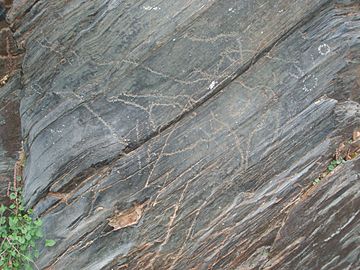Siega Verde facts for kids
| UNESCO World Heritage Site | |
|---|---|

Engravings of animals.
|
|
| Location | Serranillo, Villar de la Yegua, Campo de Argañán, Province of Salamanca, Castile and León, Spain |
| Part of | Prehistoric Rock Art Sites in the Côa Valley and Siega Verde |
| Criteria | Cultural: (i), (iii) |
| Inscription | 1998 (22nd Session) |
| Extensions | 2010 |
| Area | 0.9 ha (2.2 acres) |
| Buffer zone | 44.5 ha (110 acres) |
Siega Verde is an amazing archaeological site in Spain. It is located in a place called Serranillo, which is in the province of Salamanca in Castile and León. This special place is famous for its ancient rock carvings. In 2010, Siega Verde was added to the World Heritage List. This means it is recognized as a very important place for everyone in the world to protect. It is part of the larger Côa Valley Paleolithic Art site.
What is Siega Verde?
Siega Verde is a collection of many rock carvings. These carvings were made by people who lived a very long time ago. Professor Manuel Santoja Gómez found them in 1988. He was looking for old sites in the valley of the Águeda river.
What Animals Can You See?
The carvings show many different animals. Some of the most common ones are:
- Horses
- Aurochs (which were a type of wild cattle, now extinct)
- Deer
- Goats
You can also see some animals that are not around anymore. These include:
- Bison
- Reindeer
- The woolly rhinoceros
These animals lived during the time the carvings were made.
How Old Are the Carvings?
Most of the carvings at Siega Verde are very old. They were made about 20,000 years ago. This was during a period called the Upper Palaeolithic Stone Age. The people who made them belonged to the Gravettian culture.
There are also some newer carvings. These show human-like figures. They were made around 9,000 years ago. This was during the Magdalenian age.
In total, there are 91 different panels of carvings. They stretch for about 1 kilometer along the rocks.
 | John T. Biggers |
 | Thomas Blackshear |
 | Mark Bradford |
 | Beverly Buchanan |

